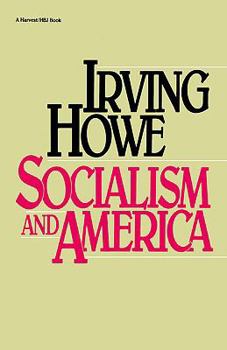Socialism and America
Select Format
Select Condition 
Book Overview
In six thoughtful, engagingly written essays, Howe surveys a movement he has known firsthand since the 1930s and reflects on its future. "Howe is a marvelously thorough and suggestive critic" (San... This description may be from another edition of this product.
Format:Paperback
Language:English
ISBN:0156835207
ISBN13:9780156835206
Release Date:January 1986
Publisher:Mariner Books
Length:240 Pages
Weight:0.60 lbs.
Dimensions:0.6" x 5.5" x 8.6"
Customer Reviews
1 rating
Marxism in the New World
Published by Thriftbooks.com User , 20 years ago
In the 1912 election socialists received six per cent of the vote. Socialism was not yet a mass movement. Before the First World War regional distinctions still existed. Successes on the Lower East Side were largely a minority affair. There was a strong populist heritage in the Southwest. Socialist encampments in Oklahoma were derivations of the religious camp meeting. The Wobblies failed to see the machine process. By 1912 at the time of the great textile strikes the IWW was already old-fashioned. The personality of Eugene Debs exerted a spell. Socialists did not work out a position to to overcome racism and did not know how to deal with the AFL. The American labor movement was weak. In America there was a strong sentiment of evangelicalism. Socialists received twenty-two per cent of the votes in local elections. The national government attacked the party for its anti-war stance. In the 1930's the old guard of socialists was unresponsive to new ideas produced by the militants and the popular front. The party had its best opportunity to win votes since the era of Eugene Debs in 1932. It is hard to imagine an historical moment other than one's own. In Austria socialists resisted facism. A great rally in support of the Austrian comrades was broken up by Communist actions. In 1936 there was a public debate between Earl Browder, a Communist party functionary, and Norman Thomas. There is a measure of truth in the statement that socialism was undone by the New Deal. Norman Thomas supported sharecroppers who were being harmed by New Deal policies it should be added. The lasting contribution of the Roosevelt era was the socialization of concern. The New Deal failed to realize distributive justice and stable properity.Socialists were challenged to produce an effective electoral strategy. The purity of the party's leadership helped speed its decline. The absence of a feudal past, material prosperity, upward mobility, an open frontier, a two party system of nonideological parties, and massive waves of immigration are factors impairing the acceptance of socialism in America. Socialism is not the same as communitarianism. Marxism offers a theory of social change, but offers little in the drawing of political arrangements. The socialist aspiration has less to do with modes of property ownership than with qualities of social life. One might ask does the utopian vision still have value to us.




